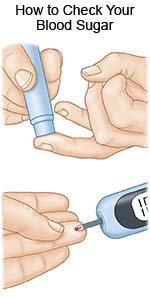Nondiabetic Hyperglycemia
Medically reviewed by Drugs.com. Last updated on Aug 4, 2025.
- Nondiabetic hyperglycemia means your blood glucose (sugar) level is high even though you do not have diabetes. Hyperglycemia may happen suddenly during a major illness or injury. Instead, hyperglycemia may happen over a longer period of time and be caused by a chronic disease.
- Hyperglycemia can increase your risk for infections, prevent healing, and it make it hard to manage your condition. It is important to treat hyperglycemia to prevent these problems. Hyperglycemia that is not treated can damage your nerves, blood vessels, tissues, and organs. Damage to arteries may increase your risk for heart attack and stroke. Nerve damage may also lead to other heart, stomach, and nerve problems.
DISCHARGE INSTRUCTIONS:
Call 911 or have someone else call for any of the following:
- You have a seizure.
- You have trouble breathing or are short of breath.
- You become weak and confused.
Return to the emergency department if:
- Your blood sugar level is higher or lower than your healthcare provider said it should be.
- Your breath smells fruity.
- You have nausea and vomiting.
- You have symptoms of dehydration, such as dark yellow urine, dry mouth and lips, and dry skin.
Contact your healthcare provider if:
- You continue to have higher blood sugar levels than your healthcare provider recommends.
- You have questions or concerns about your condition or care.
Medicines:
You may need any of the following:
- Hypoglycemic medicine helps to decrease the amount of sugar in your blood. This medicine helps your body move the sugar to your cells, where it is needed for energy. Your healthcare provider will tell you how often to take this medicine and how long to take it.
- Insulin helps to decrease blood sugar levels. You may need 1 or more shots of insulin each day. You or a family member will be taught how to give the insulin shots. Your healthcare provider will tell you how often you need to inject insulin each day. He or she will also tell you how long you will need to take it.
- Take your medicine as directed. Contact your healthcare provider if you think your medicine is not helping or if you have side effects. Tell your provider if you are allergic to any medicine. Keep a list of the medicines, vitamins, and herbs you take. Include the amounts, and when and why you take them. Bring the list or the pill bottles to follow-up visits. Carry your medicine list with you in case of an emergency.
Follow up with your healthcare provider as directed:
You may need to return for more tests. Your healthcare provider may also need to refer you to a specialist, such as a dietitian. Write down your questions so you remember to ask them during your visits.
Help prevent hyperglycemia:
- Exercise can help lower your blood sugar when it is high. It also can keep your blood sugar levels steady over time. Exercise for at least 30 minutes, 5 days a week. Work with your healthcare provider to create an exercise plan. Children should get at least 60 minutes of physical activity each day.
- Maintain a healthy weight. Ask your healthcare provider how much you should weigh. A healthy weight can help you lower your blood sugar levels. Ask your provider to help you create a weight loss plan if you are overweight. Together you can set manageable weight loss goals.
- Follow your meal plan. A dietitian will help you make a meal plan to help lower your blood sugar level. You may need to decrease the amount of carbohydrates that you eat.
- Do not smoke. Nicotine and other chemicals in cigarettes and cigars can cause lung damage. They can also make your blood sugar levels harder to control. Ask your healthcare provider for information if you currently smoke and need help to quit. E-cigarettes or smokeless tobacco still contain nicotine. Talk to your healthcare provider before you use these products.
- Limit or do not drink alcohol. Alcohol can increase your blood sugar level. A drink of alcohol is 12 ounces of beer, 5 ounces of wine, or 1½ ounces of liquor. Ask your healthcare provider if it is safe for you to drink alcohol. Also ask how much is safe for you to drink each day.
Check your blood sugar level as directed:
Your healthcare provider will tell you if you need to check your blood sugar level. He or she will also tell you how often to check it. Ask your healthcare provider what your blood sugar level should be. Write down your results, and show them to your healthcare provider. Your provider may use the results to make changes to your medicine, food, and exercise plan.
 |
© Copyright Merative 2025 Information is for End User's use only and may not be sold, redistributed or otherwise used for commercial purposes.
The above information is an educational aid only. It is not intended as medical advice for individual conditions or treatments. Talk to your doctor, nurse or pharmacist before following any medical regimen to see if it is safe and effective for you.
Learn more about Nondiabetic Hyperglycemia
Treatment options
Care guides
Further information
Always consult your healthcare provider to ensure the information displayed on this page applies to your personal circumstances.
